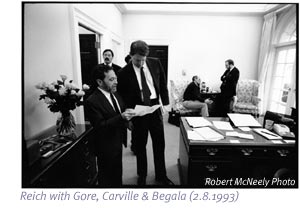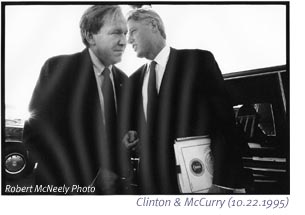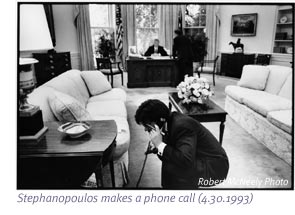
Robert Reich talks about an irritating aspect of the early days in
Clinton's presidency.
 I used to get calls from the White House. My assistant over in the Labor
Department would say, "The White House wants you to do this," or "The White
House wants you to go over here. The White House wants you to go to
California." And I discovered that there was not a White House that wanted me
to do anything. There were usually kids about 30 or 32 years old that wanted
me to do something. So I began asking my assistant, "Find out how old the
person is who wants me to go. If the person is under 40, I'm not going to go.
Over 40, then we're going to find out if the president really wants me to do
something."
I used to get calls from the White House. My assistant over in the Labor
Department would say, "The White House wants you to do this," or "The White
House wants you to go over here. The White House wants you to go to
California." And I discovered that there was not a White House that wanted me
to do anything. There were usually kids about 30 or 32 years old that wanted
me to do something. So I began asking my assistant, "Find out how old the
person is who wants me to go. If the person is under 40, I'm not going to go.
Over 40, then we're going to find out if the president really wants me to do
something."
One day you get a call from the White House, and your staff says "They want
you to go to Cleveland," and you are concerned about the age of the person on
the other end of that phone.
Yes. My chief of staff came in and said, "The White House wants you to go to
Cleveland." Well, I have nothing against Cleveland, but I have a lot of other
things that I want to do and need to do, and I said, "Well, who exactly wants
me to go to Cleveland?" And my chief of staff came back and said, "Well,
so-and-so wants you to go to Cleveland. It's not the White House. It's a
person." I said, "How old is this person?" It turned out the person was about
31 years old. I said, "I'm not going to Cleveland." I mean, there's no reason
that somebody at a relatively low level in the White House should be telling a
cabinet officer to go to Cleveland when I have a lot of other things to do. If
the president wants me to go, if the chief of staff wants me to go, if some
senior advisor wants me to go, fine, but no 31-year-old junior staffer is going
to tell me I have to go to Cleveland.


In the fall of '95 the political buzz was that former Chairman of the Joint
Chiefs of Staff Colin Powell was preparing for a presidential bid in the '96
election. As Powell toured the country to promote his autobiography My
American Journey, he remained coy about his intentions. But the mere
speculation was enough to rile the president, according to advisor Dick
Morris.
Before Dole gets the nomination, Clinton is not worried about Bob Dole
becoming the Republican nominee. He's worried about who?
Clinton was apoplectic on the subject of Colin Powell, terrified of Colin
Powell. For three months, all he could think about was Colin Powell. And he
would talk about the press giving Powell a free ride, that the press is
promoting Powell's candidacy. And he was going through all of that.
 This was when Powell was doing the book tour?
This was when Powell was doing the book tour?
The book tour, right. And I did a poll, which showed that Powell could defeat
him for president, but that there's no way he'd win the Republican nomination.
That when you told Republican voters that he was in favor of affirmative
action, that he was in favor of gun control, that he was essentially pro choice
on abortion, that he favored immigration, when you told them those positions,
they ran screaming.
And this was a situation where you had a candidate that could win the election,
but couldn't win the Republican nomination. So I told Clinton, "Don't worry
about Powell. He's not going to run, because the polls are going to show him
that he can't win the nomination. And he's not going to go into a fight he
can't win."
And sure enough, Powell dropped out, saying that it was family issues. And I
don't mean to disparage that, but the fact of the matter is that he couldn't
win the nomination. And that was a vast relief to Clinton.


Jane Sherburne talks about what happened when Kenneth Starr came to the
White House in April '95 to collect testimony from the president and first lady
on Whitewater. While Starr had a long history as an appeals court judge, his
opponents had criticized him for being ill-suited to the job of Independent
Counsel since he had no experience as a prosecutor.
In that particular interview, it was done in the president's study, which is
in the residential part of the White House. And it's a beautiful room. It's
not large. It's got a big desk. It's got all of these artifacts in it that
have got great historical significance. It's an interesting room. And the
president went first. Starr came with several deputies, and they sat along one
side of a table, and the lawyers for the president sat along the other side,
and the president sat on the end. There was a court reporter. And Starr began
by asking the first questions.
And I was sitting toward the end of the table, and close to Mark Toohey, who
was a deputy independent counsel at the time. And all of the lawyers in the
room immediately realized that Ken Starr had failed to swear in the president.
And that is a very common first-year lawyer kind of mistake. It's something
that when you're nervous about a deposition, a first-year lawyer always, you
know-- what you always say to a kid when you send him off to take their first
deposition is, "Don't forget to swear in the witness."
So I can see Mark scratching a little note that he passes down the table to Ken
Starr, and Starr stops and says, "Oh, excuse me. I need to swear in the
witness." And it was an interesting--an amusing moment, and it was an
interesting observation just how experienced Starr was at this kind of a thing.
I had heard from someone that that was his very first deposition that he had
ever taken. He was not a prosecutor by training, and this very first word or
words out of his mouth seemed to establish that.


Early into the new administration, journalists and pundits
speculated that Clinton's would be a "failed presidency." There were the
controversies over Clinton's nominees for attorney general, the furor over his
attempt to allow homosexuals in the armed forces, and, according to Dee Dee
Myers, another--perhaps more absurd--clamor over a haircut.
The president is here in Los Angeles and he gets a haircut from
Christophe on early '93, May, isn't it?
Yeah. May.
It's May. And the press finds out about it. Did you know you had a PR
disaster in the making?
No. I didn't even--again, I mean, God, I sound like a complete idiot, all the
things that I didn't see coming. But, you know, the president was here in Los
Angeles, Christophe had cut his hair a few times during the campaign. He was
friends through Harry and Linda Thomason--delightful guy, really nice person.
Of course, he'd be happy to cut the president's hair. So, he jumps on the
plane, the plane is sitting on the tarmac. And he gets his hair cut - he's
really kind of jolly. You know, he's had a good trip to L.A. He loves
California, he's out here.
And for like maybe the second time of his entire presidency, he decides to
take a trip back to visit the press, sitting in the press cabin on Air Force
One, which he never does. So he goes back there and--after he says, hello,
five minutes, you know, wasn't it great to be here in California?--he leaves.
I believe it was John King who was then with the AP, he said, "Did he just
get his hair cut?" And, you know, what am I going to say? I said, "Yeah, he
did." "And, was that the guy we saw going down the back stairs of the plane,
the long hair, that guy that used to be around the campaign sometimes?"
"Yeah."
So, you know, he's like "This is funny, oh, this is great." Well, then I
think, John puts something on the AP that said Clinton had gotten his hair cut.
Well, somehow, somebody called the FAA or something. Some unnamed source at
the FAA said, "Yeah, delayed aircraft"--which became a delayed aircraft all
over the country, which never was really true. And so, did I think I had a big
problem? The president got his hair cut on Air Force One. What's the problem
with that?
 Okay. It's not a great idea maybe to have this sort of high priced Beverly
Hills coiffure. You know, we just won a populist campaign, not a great idea.
But it's not the end of the world. I mean who cares? But it was--why is this
populist president getting his hair cut by this fancy guy--
Okay. It's not a great idea maybe to have this sort of high priced Beverly
Hills coiffure. You know, we just won a populist campaign, not a great idea.
But it's not the end of the world. I mean who cares? But it was--why is this
populist president getting his hair cut by this fancy guy--
For $200.
As if the president paid $200 for his haircut. But yes, he charges $200 a
haircut and probably more. You know, he is my friend, Christophe, so I defend
him, but then when it was married to this notion that air traffic was delayed
and here was this, you know, populist "putting-people-first" president, you
know, just basking in the perks of his new power sitting on the runway, you
know, air travelers be damned. This is the story that kind of got out there
and by the time I realized that this was a serious problem, it was off to the
races. And that thing dominated, the news for at least three days.
I think it led ABC's broadcast on sort of day two. Because it becomes such a
symbolic thing. You know, and you have to be careful of these things that
become metaphors. I think George Bush not knowing how a grocery store scanner
worked, which people absolutely [say] not true, but that became a metaphor for
an out-of-touch president and Bill Clinton sitting on Air Force One getting his
hair cut while people around the country cooled their heels and waited for him,
became a metaphor for a populist president who had gotten drunk with the perks
of his own power and was sort of not sensitive to what people wanted.
And, you know, what? It took him years to overcome that because when I left
the White House and for years I would travel around and go, "How many of you
know the president got his hair cut on Air Force One?" Every person in the
audience would always raise their hand. And how many people know that it's
really not true, the way the story was reported? And ... I think perceptions
of him have changed so much he's finally gotten past that. But it took years
for people to get past that.


Even before moving into the White House, Hillary Clinton was at the center
of public attention. When the new administration began, Hillary became the
subject of one controversy after another; there was nowhere for the first lady
to hide. Robert Reich talks about the first lady's occasional escapes.
The White House is a prison. It's impossible for a president and a first lady
to get out without being recognized, without being noticed. You have Secret
Service people around. Even in my humble outpost at the Labor Department, I
was in a bubble. It was hard for me to escape. And you can imagine how
difficult it was for them.
She said that she occasionally escaped by putting her hair up in a baseball cap
and putting eyeglasses--you know, sunglasses on, and getting on a bicycle and
bicycling on a towpath that ran next to the Potomac River--still runs next to
the Potomac River. She'd have Secret Service people on bicycles behind her,
and nobody would recognize her. I mean, after all, if her hair's up in a
baseball cap and she's got sunglasses on and she's on a bicycle, you're not
exactly going to think it's the First Lady of the United States.
At one point some Japanese tourists flagged her down, stopped her. They had
cameras, and she thought, "Oh, they recognize me." And then she said that she
got off her bicycle reluctantly, and one of the members of this little group of
Japanese tourists handed her the camera and said, "Would you mind, please,
taking our picture?"

 |  |